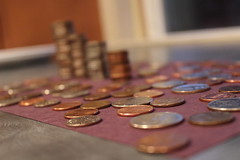| Economy (Photo credit: CassadeyFedel) |
Washington, Apr.27, stocks to watch .- Washington's efforts to balance the budget are holding back the wobbly economic recovery.
After "fiscal cliff" fears brought the economy to a near standstill late last year, many forecasters had expected growth to come roaring back in the first quarter as consumers made up delayed spending and businesses filled deferred job openings and restocked depleted inventories.
But the Commerce Department's latest read on growth Friday showed U.S. gross domestic product expanding by 2.5 percent in the first three months of the year, less than the 3.1 percent pace forecasters had expected.
Analysts say deficit-cutting moves, including a 2 percent payroll tax hike that kicked in Jan. 1 and the ongoing the federal budget cutting known as sequestration, are beginning to take a bite out of growth. That's expected to continue later this year.
(Read More: Oops! Economic Growth Wasn't So Great After All )
"The economy continues at a brisk walk at best," said Joel Naroff, chief economist at Naroff Economic Advisors. "With the tax hikes reducing disposable income and sequestration restraining federal spending, don't expect strong economic growth anytime soon."
More From NBCnews.com:
Economy Rebounds, but Less Than Expected
Spring Floods Are Here. Are You covered?
Survey: Americans Feeling More Secure About Jobs
Economy Rebounds, but Less Than Expected
Spring Floods Are Here. Are You covered?
Survey: Americans Feeling More Secure About Jobs
Friday's report said government spending in the first three months of the year fell by 4.1 percent, led by an 11.5 percent drop in defense spending.
Under a fiscal-cliffhanging budget deal reach at the start of the year, federal agencies are tasked with reducing spending by about $85 billion through the rest of the current fiscal year, which ends Oct 1. Unless Congress changes the law, similar cuts in the growth of spending are required every year until 2021.
In February, the Congressional Budget Office estimated that the budget cuts would shrink economic growth from 2 percent to 1.4 percent this year and reduce overall employment by about 750,000 jobs by year-end.
"Whatever your view is on government spending, it's going to be a headwind for growth," said Ralph Schlosstein, CEO of Evercore Partners.
The weakness appeared to worsen late in the quarter, with a much slower-than-expected performance by the job market last month. After averaging more than 200,000 jobs a month in January and February, the pace of job creation fell to 88,000 in March. More recent data have pointed to marked slowdown in retail sales, industrial production and orders for durable goods.
(Read More: US Job Creation Plunges, but Rate Drops to 7.6% )
Despite the tepid pace of hiring, companies continue to generate higher profits from relatively flat revenues. Much of those gains have come from the even slower pace of wage growth, as business managers squeeze more work out of their existing staff.
Earlier in the recovery, some of that increased productivity was generated by heavy investment in new equipment and technology. But business spending on equipment and software slowed sharply in the first quarter, growing at only a 3 percent annual rate after a brisk 11.8 percent pace in the fourth quarter.
Aside from the direct drag of higher taxes and tighter government spending, the ongoing political gridlock in Washington continues to weigh on business confidence. Many managers say they're reluctant to hire, borrow and invest to expand capacity until Congress and the White House break a long-running standoff over reforming tax laws and restructuring entitlement programs like Medicareand Social Security .
"I think the U.S. economy could bust out of the 2 percent kind of funk we're in right now, if we'd make some decisions in Washington," UPS CEO Scott Davis told CNBC. "We have a huge amount of small business commerce as our customer base. They're sitting on their hands. They're not hiring people, not making investments, until they understand the rules of the road."
Consumers again helped the economy move forward as the new year got underway. Households boosted spending at a 3.2 percent pace, the fastest since the fourth quarter of 2010.
But it remains to be seen whether that strong pace of consumer spending, which makes up more than two-thirds of economic activity, can be sustained later this year. Households relied heavily on savings to pay for purchases in the first quarter, after a payroll tax hike took a big 5.3 percent annualized bite out of incomes, the biggest such drop since the third quarter of 2009.
After sharply boosting savings and paying off debt since the end of the Great Recession, households are apparently dipping into savings again to make up for the income lost to this year's payroll tax hike. Friday's report showed the savings rate dropped sharply to 2.6 percent from the 3.9 percent average rate last year.
Consumers will continue to struggle until the job market improves and employers begin raising wages again to keep or attract good workers.
But consumer spending may get a lift later in the year if housing and stock prices continue rising, creating what economists call a "wealth effect."
"(The stock market and housing market) are going to be boosting consumer spending later this year," said Dean Maki, chief economist at Barlcays. "That's how we get up to 2.5 percent growth rate as we head into next year." ...


No comments:
Post a Comment